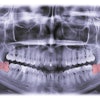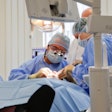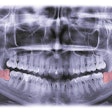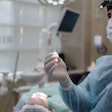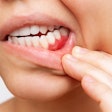
NEW YORK (Reuters Health), Jan 7 - A new study questions a recent recommendation that dentists give prophylactic antibiotics to all patients who have had joint replacement.
In early 2009, the American Academy of Orthopedic Surgery (AAOS) safety committee recommended that dentists consider antibiotic prophylaxis for all patients with total joint replacement before any dental procedure, Dr. Elie F. Berbari of the Mayo Clinic College of Medicine in Rochester, Minnesota, and colleagues write.
That recommendation followed an earlier guideline by the AAOS and the American Dental Association, who in 2003 said that antibiotic prophylaxis should only be considered in high-risk patients who have high-risk dental procedures.
Dr. Berbari's team's results, however, support the 2003 recommendation: In a study reported in the January 1st issue of Clinical Infectious Diseases, they found no association between dental procedures, with or without antibiotic prophylaxis, and the risk of total hip or knee infection.
"The risk of seeding a prosthesis from bacteria in the blood is certainly there," Dr. Berbari told Reuters Health. But, he added, routine activities such as toothbrushing, flossing, and chewing are much more likely to cause this seeding than transient bacteremia after a dental procedure.
Dr. Berbari and his colleagues compared 339 patients with such infections treated at their hospital between 2001 and 2006 to 339 patients with total hip or knee arthroplasty who did not have infections, but were hospitalized on the same floor.
Fourteen percent of case patients and 8% of controls were edentulous when enrolled in the study. Fifty-seven percent of the dentate case patients and 47% of controls had undergone a low-risk dental procedure during the observation period, while 48% of cases and 34% of controls had undergone a high-risk procedure.
Patients who underwent a low- or high-risk dental procedure in the two years before hospitalization and didn't receive antibiotic prophylaxis were not at increased risk for prosthetic hip or knee infection, the researchers found. And antibiotic prophylaxis before a low- or high-risk dental procedure didn't reduce the likelihood of infection.
The researchers did find that people who had regular dental hygiene visits were at 30% lower risk of infection, although this wasn't statistically significant.
While the current study is not a randomized controlled trial, Dr. Berbari said, it is large and "rigorously done," despite biases and limitations, and provides data "in a field that's mostly been plagued by expert opinions and not a lot of good science." A randomized controlled trial would have been difficult, he added, given the rarity of joint arthroplasty infection.
Based on the findings, he added, "better dental hygiene in patients with joint arthroplasty is certainly warranted."
That's particularly relevant, because the fear of joint infection may cause some patients to avoid going to the dentist, write Dr. Werner Zimmerli and Dr. Parham Sendi of the University of Bern in Switzerland in an editorial accompanying the study.
The new findings, they add, should "reassure the responsible physicians and dentists that antibiotic prophylaxis is not needed for all patients with joint replacement prior to any dental procedure and to convince individuals with joint replacement that meticulous dental hygiene is important."
Clin Infect Dis 2010;50:8-19.
Last Updated: 2010-01-01 10:00:29 -0400 (Reuters Health)
Copyright © 2010 Reuters Limited. All rights reserved. Republication or redistribution of Reuters content, including by framing or similar means, is expressly prohibited without the prior written consent of Reuters. Reuters shall not be liable for any errors or delays in the content, or for any actions taken in reliance thereon. Reuters and the Reuters sphere logo are registered trademarks and trademarks of the Reuters group of companies around the world.



